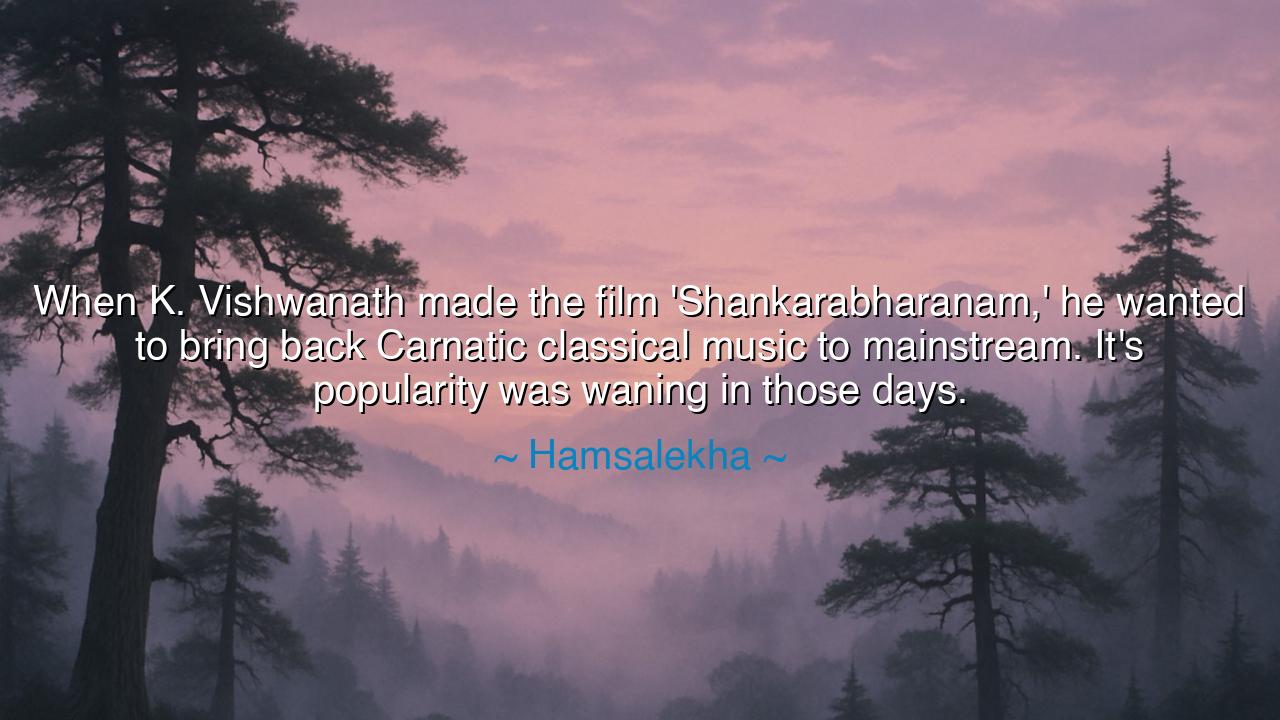
When K. Vishwanath made the film 'Shankarabharanam,' he wanted
When K. Vishwanath made the film 'Shankarabharanam,' he wanted to bring back Carnatic classical music to mainstream. It's popularity was waning in those days.






Hamsalekha, the poet of melodies, once spoke of a great act of cultural guardianship: “When K. Vishwanath made the film Shankarabharanam, he wanted to bring back Carnatic classical music to mainstream. Its popularity was waning in those days.” These words resound like a bell struck in a temple of memory, for they tell not only of a film, but of a battle—a battle to preserve a treasure of the spirit against the erosion of time. For Carnatic classical music, that ancient river of devotion and discipline, had begun to recede from the lives of the common people, and one man rose to call it back into their hearts.
In the making of Shankarabharanam, K. Vishwanath did not merely craft a motion picture; he performed an act of cultural resurrection. He saw that this music, once revered as a vessel of divine beauty, was slipping into obscurity amidst the noise of new fashions. Lesser spirits might have mourned silently, but Vishwanath, like a guardian of tradition, chose to act. He clothed Carnatic music in the garments of cinema, and in doing so, he carried it back to the ears and souls of millions. The film became not only entertainment, but a pilgrimage, leading audiences to rediscover the sacred beauty of their own heritage.
It is the eternal struggle: every generation is tempted to cast aside the old for the glitter of the new. But wisdom whispers that not all that is old is obsolete. Some treasures are timeless, awaiting only the hand of a guardian to dust them off and reveal their luster once more. Vishwanath, through Shankarabharanam, became that guardian. He showed that art does not die when forgotten; it dies only when neglected. And when embraced anew, it rises, radiant and alive, to inspire yet another age.
Consider the story of Béla Bartók, the Hungarian composer who, in the early 20th century, saw the folk songs of his land vanishing under the march of modernity. Like Vishwanath, he gathered these melodies, preserved them, and wove them into the fabric of classical composition. His work did not merely preserve tradition—it reawakened it, giving strength to the identity of a people. In both East and West, the pattern is the same: the guardians of art must rise when the tide of neglect threatens to drown what is sacred.
The deeper meaning of Hamsalekha’s words is thus revealed: art must be defended. When a culture grows careless, its finest treasures slip away. But when visionaries like Vishwanath remind the people of their inheritance, a renaissance dawns. For music is not mere sound; it is memory, devotion, discipline, and identity. To forget it is to forget oneself. To revive it is to strengthen the roots from which future generations will grow.
Let this be the lesson: each of us is a guardian of something ancient, something fragile. It may be a tradition, a language, a song, or a virtue. When it wanes, do not shrug and say, “It is dying.” Instead, act as Vishwanath acted: lift it up, breathe new life into it, and carry it into the present. For in doing so, you pass on a gift not only to yourself but to all who will come after.
And what are the actions we must take? Seek the beauty of your heritage. Learn the songs of your ancestors. Support the arts that are fading, lest they be lost. Do not despise the new, but let the old stand beside it, like an elder guiding a child. Create, share, and celebrate what is timeless. In this way, you become not only a consumer of culture, but a guardian of culture, like Vishwanath himself.
So let us remember: Shankarabharanam was more than a film; it was a torch lifted high against the gathering dark. And as Hamsalekha reminds us, it rekindled the fire of Carnatic music, ensuring that the river of sound would continue to flow. Let each of us, in our own sphere, do likewise—revive, preserve, and pass on that which is beautiful and true. For the future is built not only by invention, but by remembrance.






AAdministratorAdministrator
Welcome, honored guests. Please leave a comment, we will respond soon